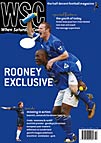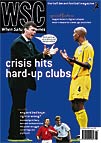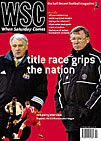 Dear WSC
Dear WSC
Have any other readers noticed that clubs and players seem to be under increasing pressure to pay money for successful outcomes to fixtures? On The Premiership, September 28, Jon Champion at Man City v Liverpool observed that “Michael Owen can’t buy a goal from open play at the moment”. A bit later, during Charlton v Man Utd, Clive Tyldesley told us: “Charlton can’t buy a home win this season.” I know football is a money-dominated sport, but this is ridiculous. However, what I really want to know is how does the system work? Is there a sliding scale of charges, so that Owen could afford to buy a goal against the generous Man City defence, but not against West Brom’s tight back four the previous week? Are “six-pointers” decided by bids in a sealed envelope, which may explain why Sunderland beat Villa, but Bolton v Southampton was a draw? And do teams expected to win easily not bother buying that week? This would certainly account for Chelsea’s home crash to West Ham. To take it further, do supermarket-style special offers and other assorted gimmickry apply? For instance, was Owen’s hat-trick part of a “buy two, get one free” arrangement? Did Charlton, who led at half-time but eventually lost, buy a past-its-sell-by-date home win for half price? And is there a loyalty card system for frequent win buying? Arsenal must be well sorted if there is. It would be bad enough if this was limited to the top flight, but it’s even happening in the Nationwide. Ronnie Moore, explaining my team Rotherham’s unexpectedly good start, cautioned that: “This time last season Grimsby were top of the league, but their manager couldn’t buy a win after that.” So, as a Miller, can I please urge whoever is in charge of our points purchasing department to keep up the good work and carrying on signing the cheques.
Steve Ducker, via email
Search: 'John Barnes'
Stories
 Jim McLean has finally quit. Ken Gall says the man who made Dundee United great was right about most things, even if he didn't always put it politely
Jim McLean has finally quit. Ken Gall says the man who made Dundee United great was right about most things, even if he didn't always put it politely
With all four Scottish entrants for European club competition experiencing varying degrees of disappointment and humiliation, and Arsène Wenger openly scoffing at the notion of ever signing a Scottish player, one might imagine that the game north of the border could do with all the help it can get.
 This time there was no one else to blame, but that hasn't stopped some people believing England are on the verge of something great. Cris Freddi begs to differ
This time there was no one else to blame, but that hasn't stopped some people believing England are on the verge of something great. Cris Freddi begs to differ
No need for a blow-by-blow: we all saw the same tournament. When England managed to protect a lead, they had shape and substance. When they didn’t, it wasn’t pretty. Denmark self-destructed and Nigeria didn’t matter, but Argentina was one of the great ones, a spookily complete payback. No coincidence, surely, that it was played under cover, in controlled conditions – and that it bucketed down for Denmark.
 Plymouth Argyle fan Rob Synnott looks at his clubs fortunes, the current crop and rivalries
Plymouth Argyle fan Rob Synnott looks at his clubs fortunes, the current crop and rivalries
What are the main reasons why Argyle have under-achieved over the years ?
Certainly the club has been left behind in terms of infrastructure, especially with the stadium, although that would now appear to be a thing of the past. Equally, the geographical position of Plymouth has dissuaded many would-be players from joining the club. Stories abound of prospective signings having to be offered sweeteners to even consider travelling this far south-west. The upshot has been that it has proved frustratingly difficult to attract the calibre of player and staff necessary to improve the club.
 What are the realistic ambitions for those outside the top half of the Premiership? Gary Parkinson discusses Bolton's future following promotion
What are the realistic ambitions for those outside the top half of the Premiership? Gary Parkinson discusses Bolton's future following promotion
Given the financial constraints which led to previous manager Colin Todd resigning after being forced to sell one player too many, it’s still a source of amazement to many that Sam Allardyce managed to get Bolton promoted. Since he took over two years ago the fire sale has stopped but he has continued to barter, flogging £10 million worth of players (notably Eidur Gudjohnsen and Claus Jensen) while spending less than £4 million.